Social Ties
Are online social games the future of interactive entertainment?
Can tens of millions of people around the world be wrong? Is calculating the growth time of a turnip fun? Are farm simulators and virtual gang wars real games? Who said hours of virtual ploughing, planting, and harvesting isn't worthwhile?
By now it seems that social games are not just a passing trend. Given the term "social gaming" didn't even exist until three years ago, it's hard to believe these games can now make millions in their first month on the market. The overnight success of Facebook applications like FarmVille, Mafia Wars, and Restaurant City has brought with it a spate of social game developers keen to capitalise on the public's newfound love of virtual interaction. According to these developers, social games are neither a trend nor a concrete form of interactive entertainment--they are a catalyst for something deeper and much less volatile: a new genre of inherently social video games. The question of whether social games are here to stay has already been answered; the new question is will the social boom change the way we play video games? Could shooting bad guys in postapocalyptic wastelands be one day replaced by milking cattle on a farm? Will big-name game publishers swap consoles and PCs for Facebook and other social media platforms?
In this GameSpot feature we take a look behind the scenes of social games and talk to the developers and publishers of some of the most popular social games on the market. We also look at the appeal of social games, the intricacies behind their successful business model, the size and scope of the market, and the role social networks play in providing a home ground for these titles. Finally, we talk to game publishers to find out what plans the global video game industry has for integrating, acquiring, and learning from the success of social games and those who make them.
The social gaming market
What turns social games into overnight sensations? What fuels millions of people to get out of bed every morning and plough their virtual farms? Social games allow users to develop a virtual identity--be it as a farmer, a mafia leader, or a restaurant owner, for instance--and expand on this identity through other user interaction; this keeps users coming back to interact not just with the game itself but also with other users within it. As more and more users sign up, the phenomenon becomes viral. Suddenly, everyone's a constant gardener.
A March 2010 report by European investment bank GP Bullhound, titled Social Gaming: The Fastest Growing Segment of the Games Market, found that the global social gaming sector made $1 billion in revenue in 2009, representing 2 percent of the $50 billion global games market. This number is expected to rise to $3 billion by 2012. The key players in this rapidly rising industry are social game developers like Zynga, Playfish, Crowdstar, and PopCap, whose games have become viral sensations on Facebook. Titles like FarmVille, Mafia Wars, Café World, PetVille, Pet Society, and Restaurant City are consistent record-breakers, reeling in more and more users each day. Zynga is currently the dominant force in the social games sector, with more than 66.4 million active daily users and 42 social games available on Facebook (FarmVille alone boasts more than 30 million daily active users). Trailing Zynga are Playfish/EA, with 10.3 million active daily users and 30 Facebook games, and Crowdstar, with 9.4 million active daily users and 12 Facebook games.
The proverbial cash cow--the farm puns will end soon, promise--is fed through microtransactions: a free-to-play business model that relies on users paying small amounts of money for virtual goods and in-game items. Social games also use other forms of revenue, such as advertising and subscription models; however, according to the GP Bullhound report, microtransactions account for approximately 80 to 90 percent of revenue for social game developers. The more popular social games can generate between $2,000 to $5,000 in revenue per day. For example, in 2009, Zynga made around $150 million in revenue from its Facebook applications.

The decline of MySpace has led to Facebook becoming the dominant platform for social gaming, with some 400 million active users expected to grow to 800 million in the next few years. Dedicated social gaming platforms are also popular, with sites like Club Penguin in the children's category and Gaia Online and Hi5 in the teen space growing rapidly in the past three years. According to a recent study by the Information Services Group in conjunction with PopCap Games, the average social gamer is a 43-year-old female. The study surveyed 1,200 respondents from the US and UK and showed that more than 24 percent of Internet users said they play social games while 68 percent of US players said they played daily for an average of half an hour or more.
With such money to be made, it's not surprising that social gaming has attracted the interest of video game publishers looking to enter into--and undoubtedly capitalise on--the social boom. The idea is simple: social games cost significantly less time and money to develop than console and PC games and present a much lower risk to developers who are working on new intellectual property. Where a AAA title can cost anywhere up to $100 million to develop, an average social game costs $100,000 to $200,000 and can be ready to go in less than six months. Like most video game market analysts, GP Bullhound expects that in the next few years more and more publishers will look into spending an increasing amount of development time and money on making games for lower-cost platforms like the iPhone and social networks such as Facebook.
What this will inevitably lead to is a significant consolidation in both the global and social games markets. Key players emerging within the social game sphere will slowly do away with smaller developers, while game publishers will take EA's lead and look to acquire social developers or begin making their own titles. Click on the Next Page link to see the rest of the feature!
Why social games?
Understanding how social games make money is simple compared to understanding why. According to Andrew Campbell, a psychologist and lecturer in the Faculty of Health Science at the University of Sydney, there are two things that have helped social games become popular--time and simplicity. Time, because most people who play social games are time-poor and are not able to, or interested in, larger or more involved gameplay beyond simple viral games on Facebook; and simplicity, because most people do not want to learn a set of skills in order to engage in a game.
"People want to feel smart, and most social games offer them a chance at that type of reward," Campbell said. "For me, I find I like beating my friends. It gives me a sense of cleverness, even though some of the games I play has more to do with chance than intelligence. For others, it could be the same, but research has found it really is just a need to master a game, whether it be against friends or not," he said.
According to Campbell, the most important component of a successful social game is prestige.
"Some of the most compelling social games are about speed of cognitive processing. For others, such as card and dice games, it's about chance and strategy. Then there are theme-based sandbox games such as FarmVille, which are based more on collecting and developing a world over a period of time. But all of them have one thing in common--the more prestige one can boast, the more one feels that they are mastering the game," he said.

Campbell has been researching video games and their impact on human behaviour for more than a decade. He is also an avid social gamer--from his perspective, social games are a good talking point in social networking and a good way to relax. He believes the key difference between social games and video games comes down to the depth of the immersive experience. For example, a well-developed video game is always going to captivate gamers to engage in longer gameplay. However, for social games, the depth of the gameplay experience is not a necessary component.
"Social gaming is really a short sequence of linear gameplay that is not necessarily story-based or competitive enough to really invest a lot of emotion or effort into. I see social gaming as cheap and brief entertainment versus normal video games that can be expensive but compelling gaming experiences," he said.
But it's exactly the "cheap and brief" that has made social games so profitable. According to Campbell, games have always had a social element to them--the new breed has simply found a way to capitalize on that.
"Social games started decades before social networking," Campbell said. "The typical social game originated with Pong in the mid 1970s--2D linear games with a score-based reward system. From there we saw Game and Watches and later crude 'edutainment' games designed to teach users mathematic skills or other skills. All of these games had a short, social, or education point to them, and so social networks became the perfect platform for them because they require very little computational power to run."
Campbell believes that the gaming industry is rapidly realizing that social gaming is a worthwhile investment, particularly because of the demographic it favours. The potential for a new market is now possible, which will lead to a change in how video games are developed in the future.
"Social gaming is most unlikely to die out. Throughout human evolution we have always created basic social games for ourselves to entertain the player and even those who watch. As such, social games and mainstream video games are likely to merge to some degree. We have already seen this with online gameplay--if a game does not have a community-based play option it is going to be short-lived. Simplifying the interface and rules of video games is likely to be the next step toward the crossover of the two genres, and I think it's exciting times ahead for gamers of any ilk," he said.

The social game developers
By now most game publishers have come to the realization that creating social games can be a lot cheaper, quicker, and, in most cases, more profitable than developing a string of big-budget AAA titles. However, the reason so many have yet to join the social club is due to another, more important recognition: that the social gaming target market is still a relatively unstable one, meaning finding success is just as much about chance as it is about skill.
London-based Playfish is considered one of the largest and most successful in the market today. Founded in 2007, Playfish saw an opportunity to jump ship with the launch of Facebook’s application platform in 2007. The studio's first Facebook game, Who Has The Biggest Brain?, was launched in late 2007; it became one of the first Facebook titles to attract over a million daily players in its first six months. Since then the company has experienced exponential growth, releasing 12 games in total on Facebook--including Restaurant City, Hotel City, and Pet Society--and it underwent an acquisition deal with EA. Company cofounder Sebastien de Halleux says Playfish's aim is to change the way games are made in order to ensure that everyone can play them.
"We want non-gamers to play games, but at the moment many people find the barriers for entry too high--either consoles are too expensive, or the games are too complicated, and so on," de Halleux said. "What we want to do is take the focus away from good graphics and the solo experience and simply entertain people by connecting them with their friends."
So far, this plan is working: Pet Society is now one of the most popular games on Facebook, with some 20 million active monthly users, closely followed by Restaurant City, with 16 million active monthly users, and Hotel City, with 9 million active monthly users. According to de Halleux, social games stir a different set of emotions in users than video games do. For example, solitary feelings like achievement and frustration are common in video games, but are replaced with social emotions such as love, friendship, and pride when it comes to social games.
"Social games bring the ability to play with people who have a meaning to you both online and offline. That's a powerful motivator to play, especially for non-gamers. These games bring the value of social interaction back into gaming, something that the traditional game industry has steered away from in the last 20 years," he said.
While the video game industry has to date remained largely unaffected by the popularity of its social gaming cousin, de Halleux believes it won't be long before both industries change the way they operate.
"Social games are not trying to replace video games; they're trying to address a new audience that otherwise would have never played games. And that is not bad. I believe in the next 24 months the notion of social games will disappear altogether and all games will be inherently social. Every game will try and offer a way to play with your real-life friends online," he said.
EA recognized the truth in de Halleux's words early on, moving in to acquire Playfish in November 2009 for $275 million. De Halleux initially resisted, but gave in when he realized the deal could help the company in the future.
"Going forward it is clear that the social gaming space will become more serious. We'll see more big publishers acquiring small developers, and we'll see the rise of the billion-dollar franchise, similar to what we saw with World of Warcraft and Grand Theft Auto, but bigger," he said. Click on the Next Page link to see the rest of the feature!
One of the first signs of a possible fusion between video games and social games is a crossover of genres. According to PopCap Games--creator of the Bejeweled franchise, Peggle, Zuma, and Plants vs. Zombies--social games simplify traditional gaming genres like RPGs and introduce them to a new audience. PopCap Games cofounder John Vechey says existing game brands will not see success in social networks if they are simply plugged into social application programming interfaces (APIs)--significant design changes and adaptations are needed to succeed in this space.
"I think social games create new possibilities for the video game industry by evolving the design processes," Vechey said. "The list of top games currently available on Facebook has broadened gaming, and gaming audience, and introduced a series of new genres that most people in the game industry would not have thought possible just a couple of years ago. For example, prior to social games, most 35-plus women would have never played an RPG. Now, millions of people are consuming those and other complex game genres in simplified, accessible forms," he said.
The original PopCap plan, back when the developer formed in 2000, was to work on Java Web games, which could be licensed back to bigger companies in order to make enough money to enable it to work on more games. When this business model crumbled, PopCap took things in a different direction, trying out the shareware model first used in the earliest days of personal computers: try before you buy. In 2001 PopCap released its flagship puzzle title Bejeweled, the first game in the popular franchise that to date has collectively sold more than 50 million units, has made the Guinness Book of World Records, and has become available on PCs, mobile phones, video game consoles, iPods, social networks, in-flight entertainment systems, and scratch-off lottery tickets, and consumed seven billion hours of play time (which roughly equals 798,000 years). Ten years after it first launched, Bejeweled has made the move to Facebook, with the one-minute Bejeweled Blitz. Vechey says that while Bejeweled made PopCap the founding fathers of casual games, it's Plants vs. Zombies that is helping the company continue that reign on the innovation front.
"It made $1 million in its first nine days of availability on the iPhone. But more importantly, the game has helped us attract a sizable portion of the core gaming audience. Our challenge has been to figure [out] a broad way to connect players with one another around our games. We know for sure that games can be even more fun when played with friends. And this is where social games and Facebook have really empowered us to move things forward. In future, we plan to integrate nearly all of our games with social networks to enable our players to share their game experiences with their friends," he said.
This view is also shared by Electronic Arts founder Trip Hawkins, who left EA in 1991 and now runs his own social game development studio, Digital Chocolate. The company began developing mobile titles but soon moved on to social games for sites like Facebook; its first Facebook outing, strategy title Tower Bloxx, grew virally when it was first released. Since the release of the iPhone, Digital Chocolate has moved back into the mobile space, making more than 60 games for the platform last year.
"If you had Googled one of our brands before we released Tower Bloxx, you would have gotten 500 page hits; now you get a million," Hawkins said. "That's the benefit of the viral spread. The new social games we’re releasing are deeper, richer, and more engaging. That's what people want."
In March this year, Digital Chocolate launched NanoStar on Facebook--a platform designed to host a series of smaller social games with transferrable characters that can be either unlocked or purchased. The first game on the platform, NanoStar Castles, is a simplified version of a trading card game. Hawkins says the trick is in timeless gameplay elements and replay value (like fantasy sports and Pokemon).
"Even without emotional attachment to characters, trading card games are enjoyed by lots of people. Our NanoStar characters are living, breathing characters, which makes them more emotionally exciting. At its heart, this is a very simple card game. Simple ideas like this are the way forward in this market," he said.
Hawkins plans to continue expanding Digital Chocolate's roster of Facebook titles compatible with the NanoStar system, building up to an online community in the future.
"People are just beginning to get the idea that wherever they are, no matter what device they have, they can get access to the Internet. Customers will soon have the same expectation about games. We want the experience of social gaming to be simple and convenient, and that's why we don't intend to make highly elaborate, high-performance games, because that will only alienate people. We're trying to design games that can be played by anybody. That's where the future of gaming lies," he said.
Colin Sebastian, director of equity research in the Internet and Interactive Entertainment division of Lazard Capital Markets, agrees that the future of gaming will be shaped by social networks and social games. He expects video game publishers to recognize and embrace the social gaming trend by looking at developing social titles and acquiring social game developers.
"It's too hard to ignore a billion-dollar market that is growing quickly. It's a profitable and attractive segment of the video game business. The trick for social game developers is to move their users from game to game without losing anyone in the process. [I believe that] social games will flourish wherever people are interacting--and currently Facebook appears to be the primary platform for socialising online," he said.

While social game developers seem to agree that the social market will soon spill into the wider video game market and affect both going forward, the social gaming sphere is also populated with a number of platforms that, unlike Facebook, are completely dedicated to social games. With the potential for more of these platforms to spring up in the future, is it possible that social gaming will stay in its own dedicated sphere without affecting the future of the video game industry?
In Part 2 of GameSpot's Social Ties feature we will look at some of these platforms, as well as talk to game publishers like Sega and Nintendo about what role social gaming plays in their plans for the future. Click on the Next Page link to see the rest of the feature!
In Part 1 of Social Ties we looked at the size and scope of the social game market and talked to social game developers to gauge their thoughts on how the future of video games would be directed and influenced by the social gaming boom. In Part 2 we talk to video game publishers about their future plans in the social gaming market and look at the rise of dedicated social gaming platforms.
While social game developers remain adamant that social gaming will have a positive influence on interactive entertainment, the extent of this influence and its effect on the way video games are made and played in the future may be a question that only game publishers can answer. Some publishers have already taken steps in this new direction; others are holding back, at least for now. Whatever happens, one thing is certain: the game industry, led by a small number of influential publishers, is prone to trends, and where one goes, others are sure to follow.
Earlier this year Sid Meier’s Civilization developer Firaxis announced it was in the process of developing a Facebook version of its popular franchise to introduce casual gamers to the world of Civilization. While the game won't be available until next year, a personal message from Firaxis founder Sid Meier on the Civilization Network Facebook page tells users of an upcoming closed beta and hints at the studio's reason for its new venture:
"Ever since we finished Civilization Revolution last year, I've been looking at ways of expanding the Civ gameplay experience to include solo, competitive, and cooperative play to take advantage of the uniqueness of social networks."
Sid's not alone in that sentiment. Last month, Capcom president Haruhiro Tsujimoto told Bloomberg in Tokyo that the publisher has plans to release its first social gaming title on Facebook as early as this year.
"Gaming on social networks is poised to impact the traditional video game industry and is a presence that cannot be ignored," Tsujimoto says. "We have to make our move."
The publishers
Earlier this year Sony made its Facebook debut with turn-based strategy title PoxNora. The game wasn't exactly new--PoxNora had its own site, where it had mustered up some 2.5 million registered users since Sony acquired it in early 2009. But the publisher saw an opportunity to increase the game’s user base by tapping into the social market and identifying its gameplay as something social gaming audiences would respond well to. Unfortunately for Sony, PoxNora failed to catch on, going from roughly 142,000 monthly active users at the start of May to 52,000 just eight days later.
Determined to break into the market, Sony tried again with the launch of The Agency: Covert Ops, a story-driven role-playing game modelled on its upcoming espionage-themed massively multiplayer online game The Agency. The game turned critics' heads for its polished design elements and intricate gameplay, sitting well above Facebook's other social titles in standard. However, just like PoxNora, it failed to grab social gamers' attention, hinting that social gamers may be frightened by the idea of a well-designed, immersive gameplay experience.
If social gamers really do feel this way, then publishers like EA and Sega are probably making a big mistake. EA moved in to acquire social game developer Playfish in November 2009, for US$275 million. EA spokesperson Tiffany Steckler says that while packaged goods account for the majority of the video game industry at present, the shift to digital distribution and subscription-based models means publishers will need to step up and make changes to the way they do business.
"Social gaming is growing very fast, and companies that define and lead in this space will be determined now," Steckler says. "I think the companies who will succeed will have a combination of high-quality games, strong IP, and cross-platform offerings. Today, the social gaming sector is a little like mobile gaming was a few years ago--many games, coming from developers of all sizes, with varying degrees of audience reach and commercial success. I see social gaming evolving in a similar way."
Steckler says EA is convinced that social gaming is here to stay.
"The number of Web users continues to grow, game offerings are getting better, and the consumer base in social games is growing. This represents a large new mainstream audience for the game industry. As a division of EA Interactive, Playfish is responsible for defining our social gaming plans working across the EA Labels to define what games will bring the most success."
Sega is being a little more vague with its plans regarding social gaming. After confirming the layoffs of more than 70 employees in April this year, Sega West president and CEO Mike Hayes told GameSpot the publisher would be setting up a new digital division in San Francisco to branch out and "reflect the changing face of the global video games market." It was announced that the new division would be working on developing titles for systems like the iPhone and iPad, with the potential to look into social media networks.
Still unsure of what to call the new division, Sega now says part of its purpose will be to gear certain operations towards emerging platforms.
"It is about creating new products for new platforms, but it is also about evolving the entire Sega presence by learning from and collaborating with these new frontiers," says Sega's director of new media and online business, Brandon Laurino. "In many ways, Sega already has and will continue to have a strong presence on these frontiers, whether it's console and PC downloadable games, mobile games, Web-based games, MMO experiences, or something new."
Laurino recognises that social games are a strong channel for growing the global gaming audience. He believes there is no doubt that social gaming is already influencing the way video games are made.
"I think games like World of Warcraft and Phantasy Star Universe are inherently social in a way, and this will continue to expand, particularly with things like Blizzard announcing the integration of Battle.net with Facebook. The kind of engagement and success that games like FarmVille are having is undeniable. There are approaches to producing and marketing products that are new in the video games industry, and that is exciting."
Laurino sees the video game industry heading towards "omni-platform" experiences, constantly evolving and branching out into new forms.
"Social games are part of the way forward. There is no single or simple answer. There are always many new platforms, opportunities, and business models, and many are complex and nuanced. You just have to be flexible and adapt."
So if EA, Sony, Sega, and Capcom all agree that investing time and energy into social gaming is a worthwhile move, does this mean other publishers will soon follow suit? According to Nintendo president Satoru Iwata, the answer is no. Last month, Iwata told analysts that he was neither threatened nor awed by the rise of social gaming, despite the clear overlap in audience. He said he did not believe that hardware dedicated to gaming will become obsolete in the future; if this were to happen, Nintendo would no doubt run into trouble (an unthinkable thought at this stage, given its dominance in global markets). On the topic of social games, Iwata was clear (as reported by Gamasutra): "I have never thought that we will need to launch social games in order to avoid our offers from becoming obsolete."
Although unwilling to discuss its future plans in regards to social gaming, Nintendo did give GameSpot this reply:
"The Wii in particular has done more to promote social interaction than any other game system, and Nintendo is always looking at ways to bring people together. Social media networks are a very interesting phenomenon and an exciting space. With Nintendo DSi, Nintendo partnered with Facebook to allow an 'Upload to Facebook' button on users' consoles. Partnerships such as this are exciting, but in terms of further developments with Nintendo and social media networks, we have nothing to announce at this stage."
Iwata could be right. Maybe social games don't have to start bunking with video games, at least not just yet. If the recent conflict between Facebook and social game developer Zynga has taught us anything, it's that another solution to the social gaming problem exists. Click on the Next Page link to see the rest of the feature!
The social gaming networks
There was a feeling of uneasiness in the room at last month's Social Gaming Summit in San Francisco. The realisation that viral growth on Facebook was quickly losing momentum had many worried. Some whispered that the platform's recent push to make developers invest their own money into the marketing of applications was making things worse for the development community; others said developers were too dependent on Facebook to be able to be profitable anywhere else. Many saw the recent and public feud between Facebook and its biggest social gaming partner, Zynga, as a precursor of things to come. Altogether, things weren't looking up for social games.
In October 2009, Facebook shocked its social game developers by announcing the introduction of its own virtual currency--Facebook Credits, to be used in social games and other site applications. The move made perfect sense: instead of hundreds of different microtransaction currencies floating around for every social game on Facebook, users would be able to use just one currency to buy in-game items and virtual goods across all applications. But there was a catch: Facebook would take a 30 percent cut of all in-game purchases. While this angered many developers, few could do anything about it because developing for Facebook still remained the most profitable and simplest business solution. Only one developer was large enough to take Facebook head-on.
Just weeks after the announcement, Zynga launched FarmVille.com on its own site--undoubtedly a bid to loosen its dependence on Facebook and draw users away from the platform. So began a highly publicized feud between the developer and Facebook, culminating in months of unsubstantiated accusations from both sides. Finally, in May 2010, Zynga announced its plans to completely break away from Facebook by starting Zynga Live, a social gaming network where it could independently host all of its titles. But the act of defiance didn't last long: just weeks later Zynga agreed to sign a five-year deal with Facebook, allowing the platform to take a 30 percent cut of its credit purchases.
Whether Zynga Live will ever surface is uncertain, and even immaterial. Developers, backed into a corner by Facebook policy and discouraged by a viral slackening of pace are already looking for a way out. And Zynga may have unwillingly provided one: dedicated social gaming networks.
Until recently, social gaming networks did not enjoy much popularity outside concentrated demographics of the market. Asking an average citizen what NeoPets are wouldn't have produced much of a response outside the 14-year-old-girl crowd, while more than one person would have scoffed at the idea of spending hours building a virtual farm. But the social gaming boom has done a lot to change this, boosting user numbers in social gaming networks and drawing in record crowds of aspiring social game developers. If Facebook as a gaming platform is in decline, is it possible social games will move into their own, segregated online space? And will this shift see social titles having less impact in the future of video game development?
Gaia Online, an amalgam of social community and social game, is widely credited as the first to use the microtransaction model that makes up the basis of social games. The site was founded in 2004 by a group of US-based comic book artists who wanted to create an online space for users interested in anime, role-playing, and video games. It grew organically in the months following, until its founders realised that the costs and resources needed to run an online community out of a shared apartment was not something they could do alone. Seeking the help of its users, Gaia placed a "donate" button on the front page, offering those who donated a small virtual golden halo as a thank you. Just 12 hours later, donations began pouring in; 24 hours later they had tripled in number.
Gaia now attracts 9 million unique visitors per month, with time spent per user per visit higher than any other social network. The site's user base is largely North American, made up of 60 percent females in the 13- to 25-year-old bracket. The core experience is connecting users to one another through a virtual avatar--users can earn virtual gold to personalise their avatar by participating in site activities such as playing social games, participating in forums, uploading art, poetry, and fiction, or by joining a virtual club. Users can also buy virtual items, ranging from US$0.50 to US$10. Gaia CEO Craig Sherman says the site has grown 10 times its growth in traffic in the last four years, making over a million dollars a month in revenue sales.
"The industry is broken into two camps: companies that have succeeded with their own branded destination website (like Gaia) and companies that have succeed by leveraging the Facebook platform," Sherman says. "But in the last year a shakeout has happened in both these categories."
Sherman believes the social gaming boom has instigated a survival-of-the-fittest scenario in both camps, a kind of Darwinian race where everyone begins at the same time, but only a few make it to the finish. While Zynga's domination on Facebook has turned other game developers away, in the dedicated social gaming space sites like Gaia, Club Penguin, Habbo, and Second Life have prospered while others have fallen behind.
"A new breed of games has emerged where social emphasis is worth more than gameplay mechanics. We actually don't see the other camp as competition--we see them as complementary in driving more traffic to social gaming in general. The secret is recognising that there is a new category that is occupying a large part of consumers' free time. A larger portion of humanity is now spending more of their leisure time playing games than they were before, so naturally this is going to keep growing at the expense of older forms of media like books, magazines, and TV."
The social gaming boom has also had an effect on social utility networks like Hi5. Founded in 2003, the Hi5 network--whose operation interface is similar to that of Facebook--found early success as one of the few social networks to be translated into 50 languages and localised throughout parts of the world. The network is popular in parts of Europe, Asia, and Mexico, with some 270 million registered users. Four months ago, the company brought on board new president and CTO Alex St John, whose job will be to transform the network into a completely dedicated social games and entertainment platform.
"One of the early insights we had was that because of that international purview, we saw a lot of sites in Asia that had success with virtual goods," St John says. "Games were the runaway success, so that's why we wanted to reorient towards social gaming."
To do this, Hi5 has launched a dedicated games portal complete with virtual currency and animated avatars; its future plans are to make major investments in new game content and a new developer program that will see an influx of new IP to the site.
"We're looking for startup developers that need a home. Almost all developers making games for Facebook feel that the window has closed, so we'd like to take them on. Everybody wants to play, wants to interact, and light games and heavy games all fall into the spectrum of people playing with each other. From that point of view, social networks are a compelling entertainment medium to almost everybody. We want to reach a younger demographic that has grown tired of console gaming."
St John believes future social games will look and feel much like the MMOs. He also believes traditional console gaming is dying and will be replaced by online games.
"You won't see an Xbox 720 or a PlayStation 4 in this lifetime," he says. "But you won't see a takeover by social games either, at least not in their current form. Social games right now are parasitic. They're viral, thin games that lose their value very quickly. Zynga only became popular because the US government cracked down on off-shore poker companies, which drove a lot of players to the Facebook application. FarmVille is a giant spamming machine."
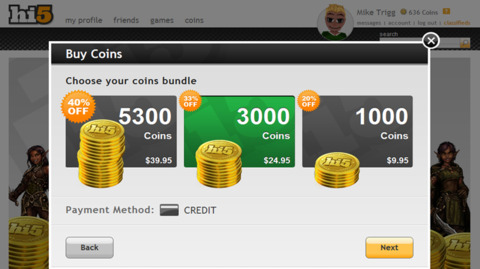
St John has a point. In the days of arcade games, consumers were used to paying for gameplay in direct proportion to how much they wanted to play--a dollar for two games, four dollars for five games, and so on. This ensured no one ever paid for what they didn't like. Consoles turned this model on its head, making consumers pay a lot more for content whose worth was decided by game publishers. This is why St John believes social games have become so popular.
"Television sets were once very rare, so if you wanted to play a game like Zelda you had to gather your four friends around the one screen in someone's living room. Nowadays screens are everywhere. Everyone has one. But people still crave that social context of playing with your friends. The role of social networking is to satisfy this craving in a world where it's become so easy to lose touch. In the future, I think all gamers will want long-term, deep, and addictive gameplay experiences that are both social and online." Will social games change the future of the video game industry? Will we all be playing FarmVille someday, blissfully unaware of our gaming past? Or will these titles naturally evolve and grow into their own online community? Let us know by leaving your comments below!
Got a news tip or want to contact us directly? Email news@gamespot.com
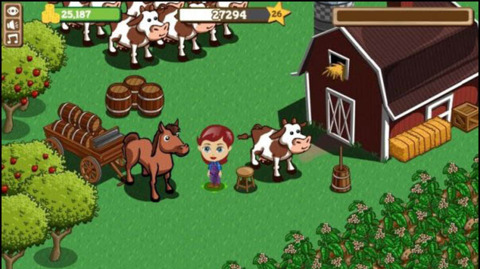

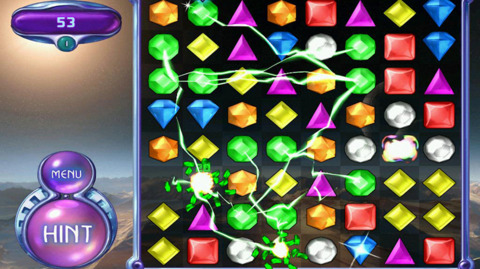


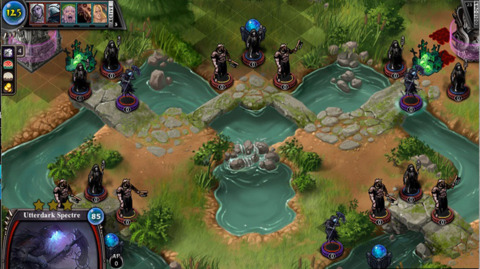
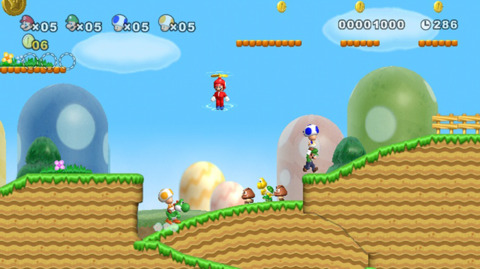

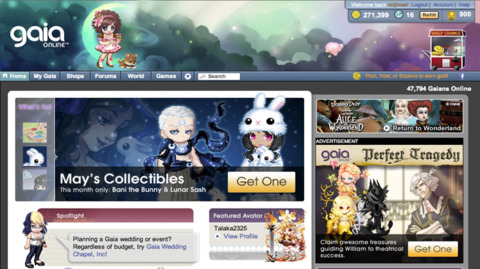
Join the conversation